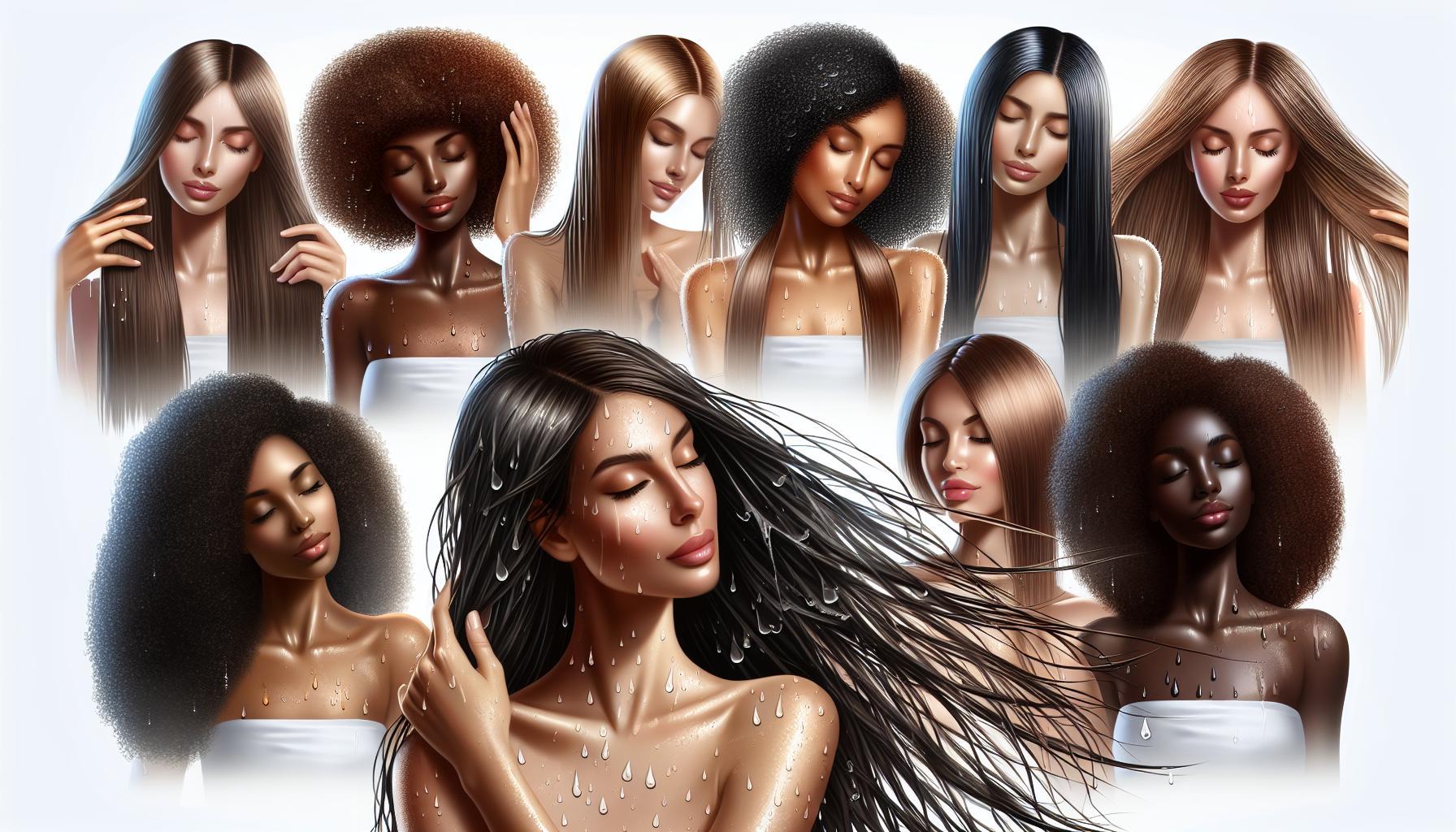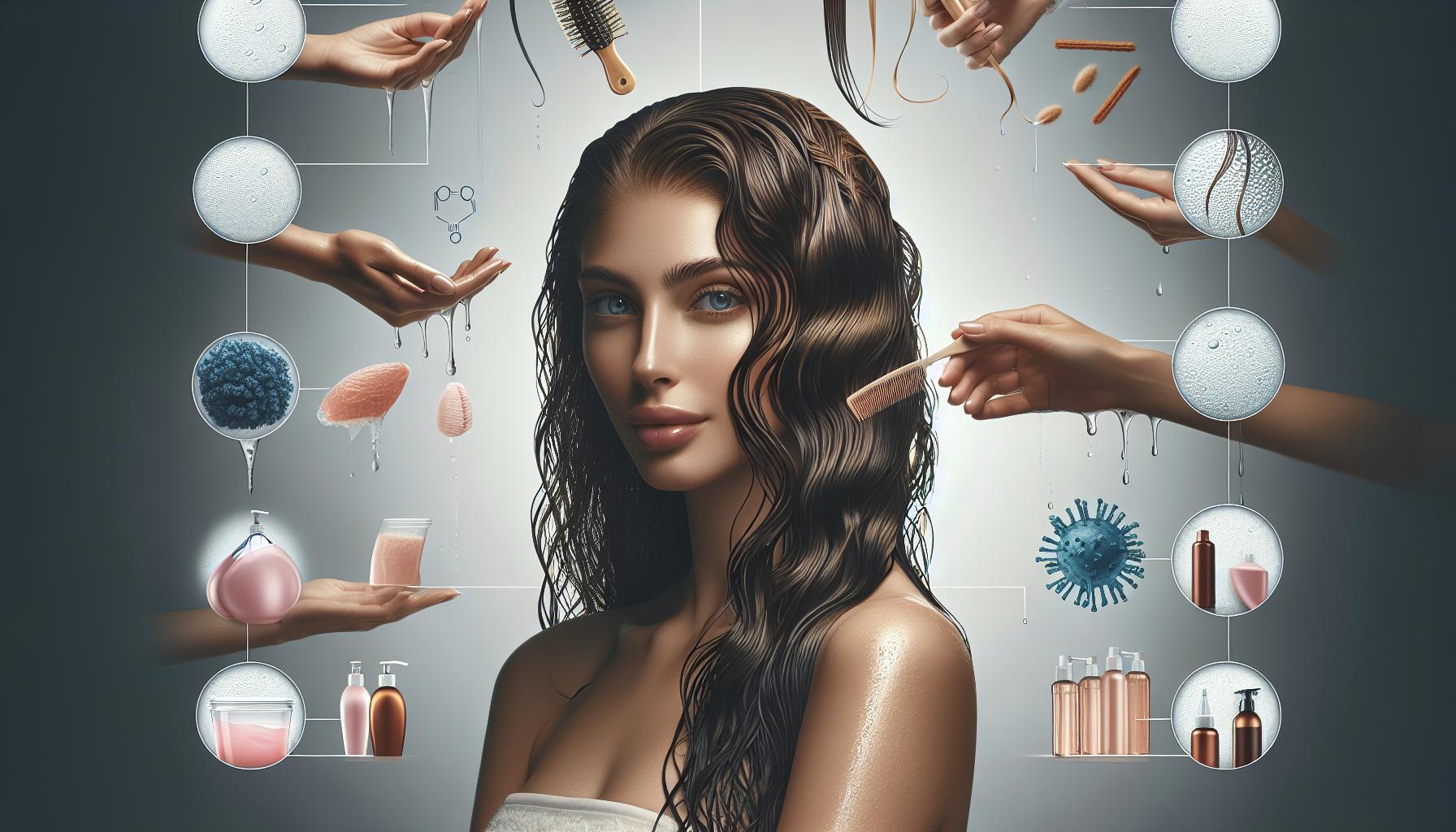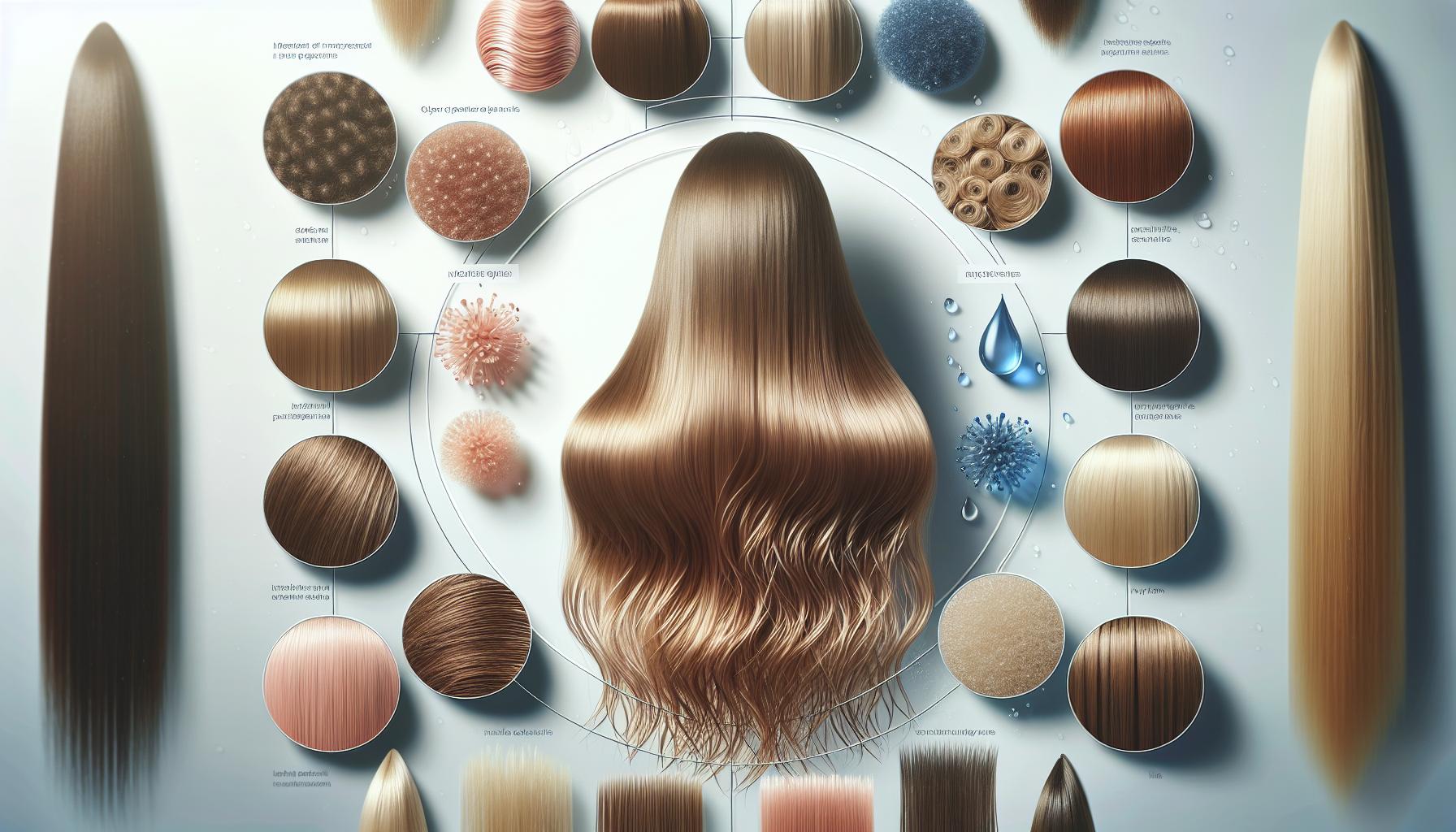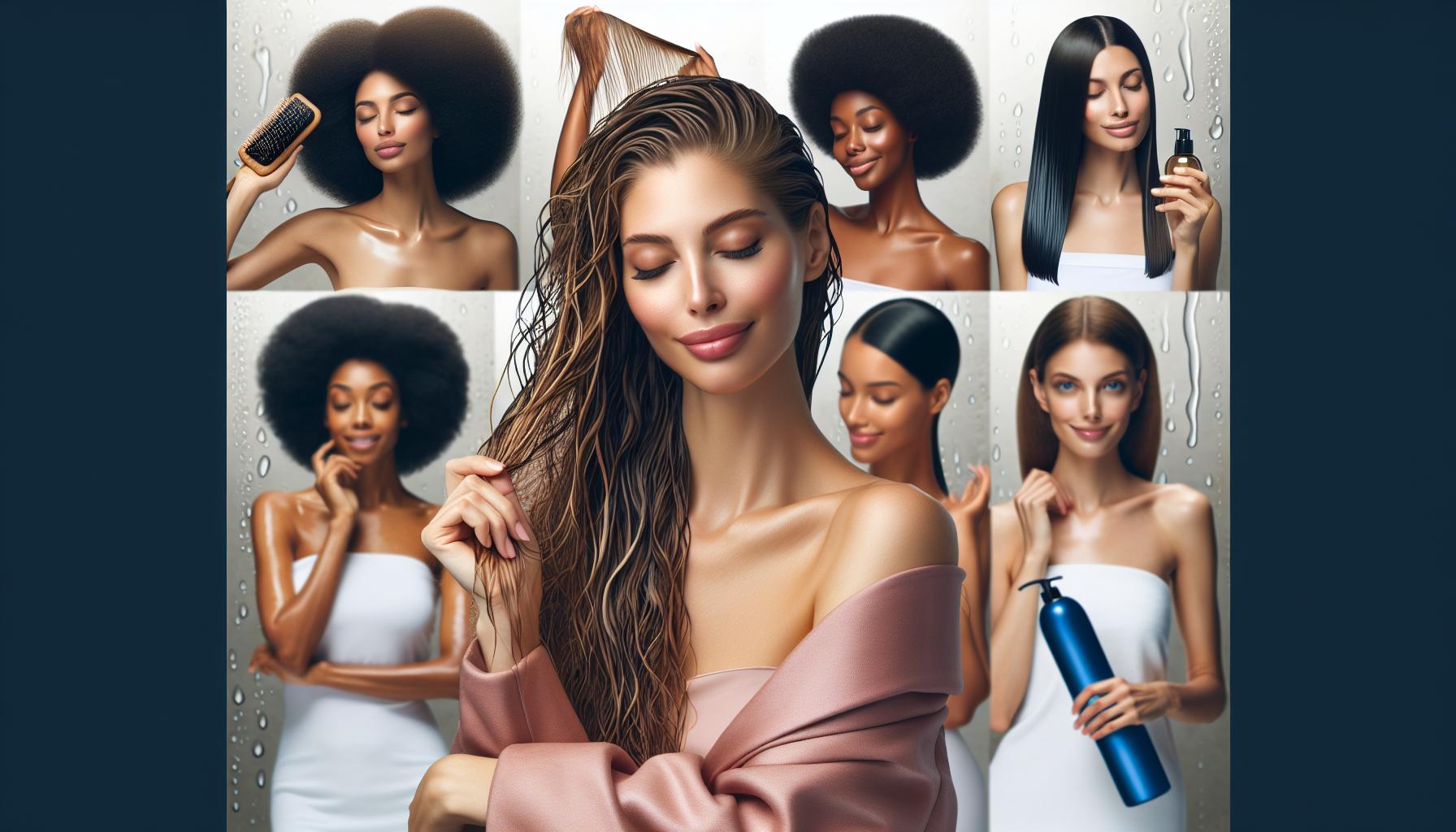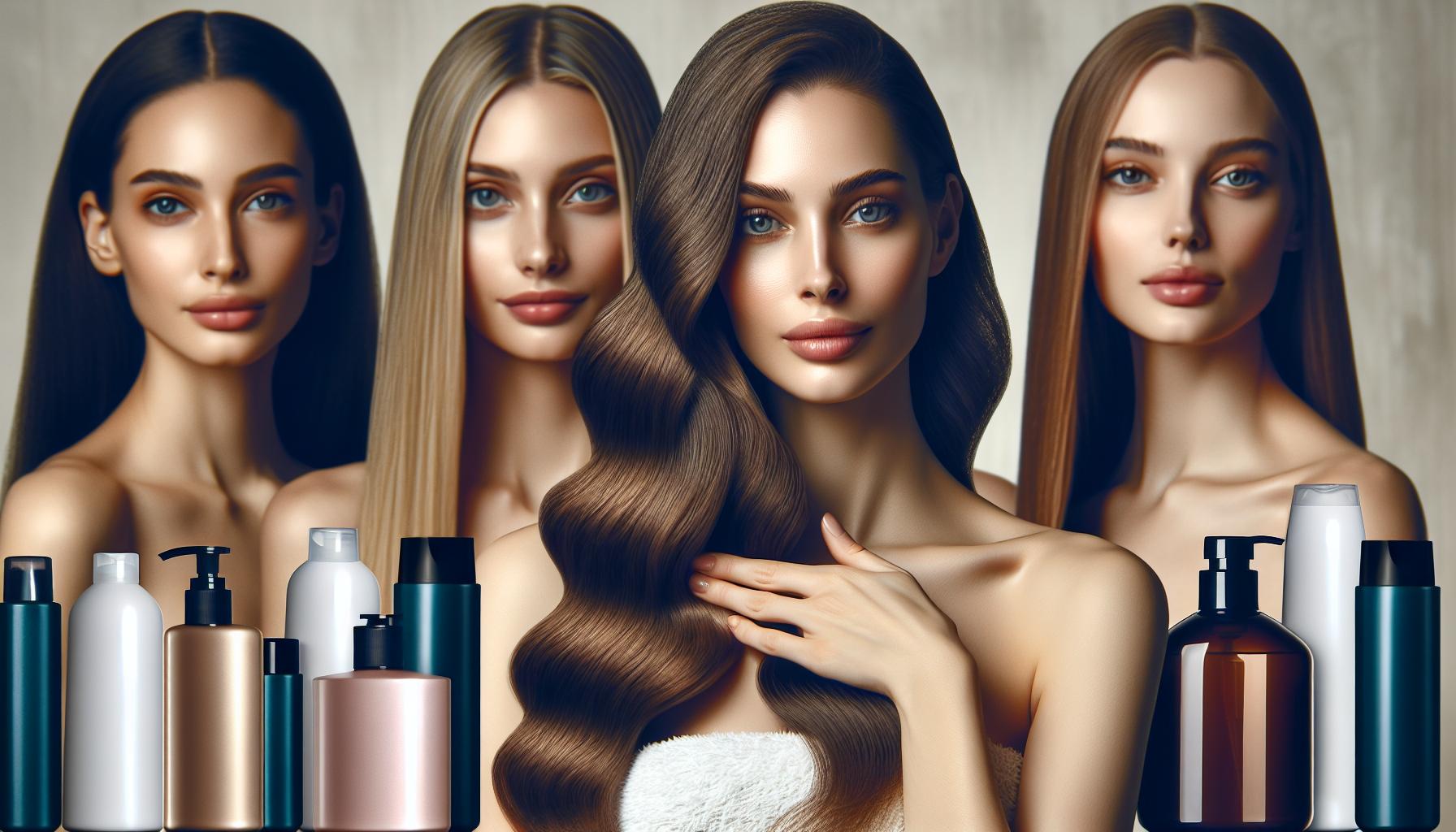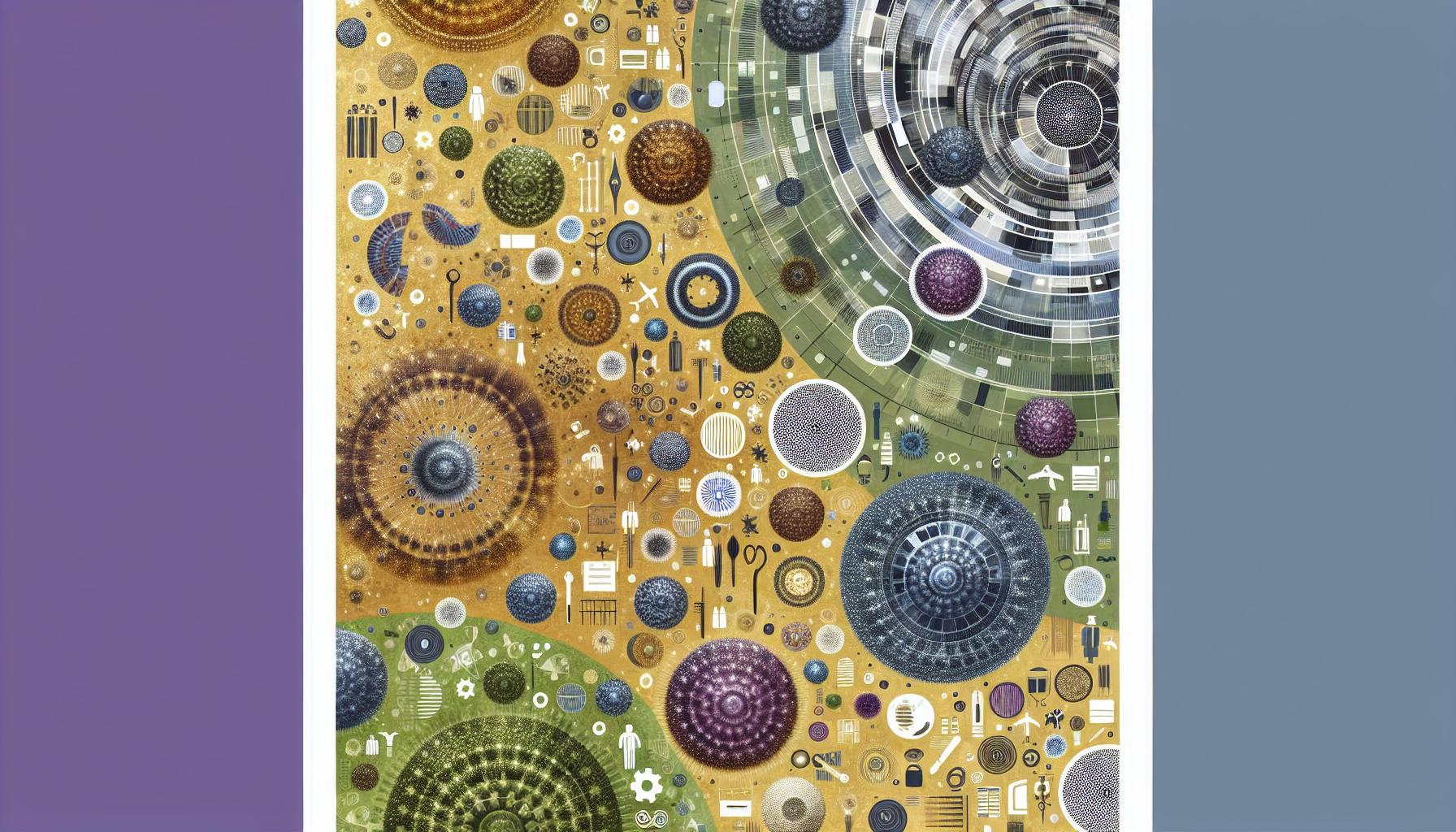Many people wonder if it’s safe to drift off with damp locks, and the answer might surprise you. While the immediate effects may seem harmless, sleeping with wet hair can lead to issues like breakage, tangling, and even fungal infections of the scalp. Understanding the risks is crucial for maintaining healthy hair and a peaceful night’s sleep.
Contents
- The Science Behind Sleeping with Wet Hair: What really Happens
- Impact of Moisture on Hair Structure: Understanding Damage
- Common Myths About Wet Hair and Sleep: Debunking Misconceptions
- Professional Insights: Hair Care Experts Weigh In
- practical Tips for Healthy Hair: Alternatives to Sleeping with Wet Locks
- The Connection Between Wet Hair and Scalp Health
- Embracing a Night Routine: How to Protect Your Hair While You Sleep
- Long-Term Effects of Wet Hair Habits: What You Should Know
- Q&A
- Can you Sleep with Wet Hair? Why This Common Habit Damages Hair?
- What are the risks of sleeping with wet hair?
- why does wet hair damage hair quality?
- How can I protect my hair if I sleep with it wet?
- Can I use products to reduce damage from sleeping with wet hair?
- What should I do instead of sleeping with wet hair?
- Is there a best time to wash my hair to avoid sleeping on it wet?
- To Wrap It Up
The Science Behind Sleeping with Wet Hair: What really Happens
Sleeping with wet hair can seem harmless, but the science behind it reveals a range of potential hazards that can affect hair health and overall scalp condition. When hair is wet, the structure of its keratin protein changes, resulting in weaker hydrogen bonds. This makes damp hair significantly more susceptible to damage, as the strands stretch and become prone to breakage and split ends when subjected to friction from pillows or sheets during sleep [[3]](https://www.rd.com/article/is-it-bad-to-sleep-with-wet-hair/).
Moreover,wet hair creates an habitat where moisture can become trapped against the scalp,fostering conditions that can lead to fungal infections. As the scalp remains in a damp state throughout the night, it increases the likelihood of dandruff and other scalp issues, which can further irritate the skin [[2]](https://www.buzzfeed.com/fjollaarifi/sleeping-with-wet-hair-sc).This is not just uncomfortable but can also contribute to long-term hair loss due to inflammation and poor scalp health.
The risk of matting and tangling is another compelling reason to avoid this habit. Wet hair is much more prone to intertwining, which can result in serious knots and tangles that are difficult to detangle, frequently enough leading to painful pulling and additional breakage during the detangling process [[1]](https://enviroliteracy.org/animals/why-is-it-bad-to-sleep-with-wet-hair/).
To mitigate these risks, here are some actionable steps to consider:
- Pat, don’t rub: If you wash your hair at night, gently pat it dry with a microfiber towel instead of vigorously rubbing it. This helps reduce friction and damage.
- Choose your hairstyle wisely: If you must go to bed with damp hair, try loosely braiding it or tying it up in a soft scrunchie to minimize tangling.
- Utilize a silk pillowcase: Switching to silk or satin pillowcases can help reduce friction while you sleep, further protecting your hair.
- Make time for drying: allow your hair to air dry or use a low-heat blow dryer to ensure it’s dry before hitting the pillow.
By understanding how sleeping with wet hair affects your locks and employing these tips, you can protect your hair’s health and maintain its shine and strength, ensuring you wake up looking your best.
Impact of Moisture on Hair Structure: Understanding Damage
Moisture plays a pivotal role in the structure and health of hair, influencing everything from its strength to its texture. Understanding how water interacts with hair strands is crucial, especially for those who frequently find themselves asking if they can sleep with wet hair. When hair is exposed to moisture for extended periods, notably in a damp environment like a bed, it enters a state that can lead to significant damage. This is largely due to the fact that wet hair is in a weakened state, rendering it more susceptible to breakage and other forms of structural damage.
The Science Behind Hair and Moisture
Hair is composed mainly of a protein called keratin,which can absorb moisture. When hair is wet, it swells and becomes more elastic, which might sound beneficial; though, this increased elasticity also means that the hair cuticle, the outer layer responsible for protecting the inner structure, is more vulnerable. Prolonged exposure to moisture can cause this outer layer to lift, leading to frizz, split ends, and an overall rough texture. Additionally, when hair remains damp overnight, it may not only get tangled but also start to form mildew or mold, which can contribute to scalp issues and further damage.
- Breakage: Wet hair is significantly weaker; the internal bonds become compromised, leading to breakage with minimal force.
- Frizz and Texture Changes: Excess moisture can affect the cuticle’s integrity, leading to an undesirable frizzy appearance.
- Scalp Health Issues: Sleeping with wet hair can create a moist environment that promotes bacterial growth, perhaps causing issues like dandruff or irritation.
practical Tips for hair Protection
To mitigate the potential damage associated with the practice of sleeping with wet hair, consider implementing a few simple strategies:
- Dry Before Bed: Always aim to dry your hair thoroughly before hitting the pillow. Using a soft towel or an old t-shirt can help absorb excess moisture without causing too much friction.
- Leave-In Conditioners: Employing a quality leave-in conditioner can provide a barrier against moisture damage. Products rich in natural oils can definately help seal the cuticle, reducing overall frizz.
- Silk or Satin Pillowcases: switching to silk or satin pillowcases can prevent friction that often exacerbates hair breakage and tangling.
appreciating the intricate relationship between moisture and hair structure enhances our understanding of why certain habits, such as sleeping with wet hair, can lead to damage. By taking proactive steps and adopting healthier nighttime routines, individuals can protect their hair from the adverse effects of moisture and maintain its health and vitality.
Common Myths About Wet Hair and Sleep: Debunking Misconceptions
While many believe that sleeping with wet hair can lead to illness, this idea is more rooted in myth than reality. the truth is that wet hair alone does not make you sick. Colds and other illnesses are caused by viruses and bacteria, not by exposure to dampness. However,there are several misconceptions about this common habit that deserve debunking.
Common Misbeliefs
- Myth 1: Wet Hair Causes Colds – Many people assume that sleeping with wet hair exposes them to illness. Though, experts agree that viruses cause colds, not the state of your hair. Staying warm is more beneficial than worry about wet hair leading to sickness.
- Myth 2: Sleeping with Wet Hair Leads to Fungal Infections – While a damp environment can encourage fungal growth,the primary risk comes from the pillow or bedding retaining moisture,not necessarily the hair itself. Proper hygiene and washing your linens regularly can mitigate these risks [[2](https://www.realstylenetwork.com/beauty/2024/05/is-sleeping-with-wet-hair-bad-exploring-the-myths-and-facts/)].
- Myth 3: wet Hair Causes Hair Damage – While wet hair is more vulnerable to damage, the act of sleeping with it wet is not inherently harmful. You can take measures,such as using a silk pillowcase or loosely tying your hair up,to reduce potential breakage [[3](https://thearchivist24.com/2025/04/24/5-common-myths-about-sleeping-with-wet-hair/)].
Understanding the Real Risks
In reality, individuals can experience benefits from allowing their hair to dry naturally overnight, as sleeping with wet hair may not lead to any immediate harm. However, there are practical steps to consider to optimize hair health.These include:
| Risk Factor | prevention Tips |
|---|---|
| Potential for fungal growth | Change and wash pillowcases regularly. |
| Increased hair breakage | Use a soft or silk pillowcase and avoid tight hairstyles. |
| Discomfort due to wetness | Consider blowing dry your hair or using a microfiber towel before bed. |
Ultimately,while you may not catch a cold from sleeping with damp hair,taking these precautions can help maintain the integrity of your hair and contribute to better overall health during your nightly routine. Understanding the myths surrounding wet hair and sleep allows individuals to make informed decisions without unneeded worry.
Professional Insights: Hair Care Experts Weigh In
Sleeping with wet hair might seem like a harmless habit,but experts warn against it for several compelling reasons. Dermatologists and hair care professionals emphasize that moisture trapped in your hair while you sleep can create an ideal breeding ground for fungi and contribute to various scalp issues, including dandruff and increased breakage. The moisture weakens strands, making them more susceptible to damage and leading to split ends and frizz.
Understanding the Risks
When assessing whether you should indulge in this common practice, it’s essential to be aware of the potential downsides. Regularly sleeping with wet hair can lead to:
- Increased Breakage: Hair tends to be more fragile when wet, and tossing and turning can exacerbate damage.
- Scalp health Issues: A damp environment promotes issues such as dandruff and fungal infections, which can affect your overall scalp health.
- Frizz and Split Ends: Wet hair is prone to frizz and split ends as it dries unevenly overnight.
if you find yourself in a situation where you must sleep with damp hair, experts reccommend specific techniques to minimize damage.A loose bun secured with a soft scrunchie can be a gentle way to keep hair contained without causing breakage, as opposed to traditional hair ties which can create stress at the points they’re secured [2[2]. Additionally, using a silk or satin pillowcase can help reduce friction, further protecting the hair from potential damage.
Expert Recommendations
To maintain healthy hair while navigating your nightly routine, consider these expert strategies:
- Air Dry Before Bed: If possible, allow your hair to air dry before hitting the pillow, which reduces moisture and the likelihood of damage.
- Use Protective Products: apply leave-in conditioners or hair oils formulated to nourish while you sleep, offering a layer of protection.
- Establish a Routine: Make it a habit to wash your hair earlier in the evening, giving it ample time to dry before sleep.
These insights reflect the consensus among hair care professionals concerning the risks associated with sleeping on wet hair. Adapting your routine to consciously avoid this practice can lead to healthier, more resilient hair over time. remember, when it comes to hair care, a proactive approach is key to preventing damage and maintaining your locks’ shine and vitality.
practical Tips for Healthy Hair: Alternatives to Sleeping with Wet Locks
the allure of slipping into bed with freshly washed hair may seem inviting, but this common practice can lead to numerous hair health issues. When hair is wet, it’s at its most vulnerable state—prone to breakage, frizz, and scalp irritations. Instead of allowing your locks to absorb moisture from your pillowcase, consider implementing strategies to maintain their health and vitality overnight.
Embrace Drying Techniques
To protect your hair before bedtime, allow it to air dry for a substantial period after washing. For optimal results, embrace the art of gentle towel-drying. Instead of vigorously rubbing your hair, which can lead to damage, gently squeeze out excess water and wrap your hair in a microfiber towel or an old cotton T-shirt. This technique reduces friction while absorbing moisture. You might also consider using a hair dryer with a low heat setting, ensuring that your hair dries quickly but does not receive high heat exposure, which can cause further damage.
Prepare your Hair for Sleep
If air drying isn’t feasible, consider braiding or loosely tying your hair up in a bun.This not only minimizes tangling but also protects the ends of your hair from friction against the pillow.Using a silk or satin pillowcase offers another layer of protection, as these materials reduce friction and can help prevent split ends and breakage. Additionally, applying a lightweight leave-in conditioner or hair oil before bedtime can provide moisture and protection, acting as a barrier against overnight wear and tear.
Keep a Consistent Routine
Establishing a nighttime hair care routine can greatly enhance the health of your hair. Use this time to assess your hair’s condition and treat it with care. For example, consider scheduling hair treatments, like deep conditioning masks, once a week to sustain its moisture content and improve resilience against damage. Consistency in your hair care regimen is essential; over time, you’ll notice a significant improvement in texture and strength.
Implementing these alternatives to sleeping with wet locks can transform not just the way your hair looks but also how it feels. By adopting these simple practices, you can ensure that your hair stays healthy, strong, and stunning, free from the adverse effects typically associated with the practice discussed in “Can you Sleep With Wet Hair? Why This Common habit Damages Hair?”
The Connection Between Wet Hair and Scalp Health
sleeping with wet hair is a common practice for many, especially after a long day or showering at night. However, this habit might be more detrimental to scalp health than most realize.When hair is wet, it creates a warm and humid environment that can foster the growth of bacteria and fungi. This environment is not only uncomfortable but can potentially lead to scalp infections, especially if you have other risk factors involved, such as existing skin conditions or a compromised immune system.
Understanding the Risks
The primary concern when it comes to sleeping with wet hair is the increased likelihood of infections.Warm, damp hair can allow microorganisms to thrive, leading to conditions like folliculitis, which is an infection of the hair follicles, or even more severe scalp issues. The prolonged exposure of wet hair against a pillow can trap moisture, creating a haven for bacteria and fungi to develop. Such conditions may not only affect the scalp but can also result in breakouts on the face if the pillowcase is contaminated with these pathogens [3].
Practical Advice for Scalp Health
To maintain optimal scalp health while still enjoying the convenience of an evening shower, consider these practical tips:
- Dry Your Hair Thoroughly: Use a microfiber towel to gently absorb excess water after washing your hair. Allow your hair to air dry for a bit before hitting the pillow.
- Choose Appropriate Bedding: Invest in breathable pillowcases made from natural fibers like cotton, which can definitely help wick away moisture compared to synthetic materials.
- Use Anti-fungal Products: Consider incorporating a medicated shampoo or scalp treatment that targets fungus and bacteria, especially if you frequently sleep with wet hair.
By adopting these habits, you can protect both your hair and scalp, ensuring that they remain healthy and vibrant even if you prefer nighttime showers. while one may question, “Can you sleep with wet hair?” it’s essential to weigh the potential risks to scalp health and take proactive steps to mitigate them.
Embracing a Night Routine: How to Protect Your Hair While You Sleep
The practice of sleeping with wet hair is surprisingly common, yet it can significantly damage your locks. As moisture accumulates overnight, hair can become more prone to breakage and frizz, leading to a less-than-desirable morning hair routine. An effective nighttime routine is essential to protect and maintain healthy hair. Embracing a few simple habits can ensure that you wake up with manageable, beautiful tresses, steering clear of the pitfalls associated with damp hair at bedtime.
To start, consider how you prepare your hair before sleeping. One practical tip is to ensure your hair is fully dry before hitting the pillow. If you’re washing your hair at night, try opting for a blow dryer or air-dry it earlier in the evening. If you must go to bed with slightly damp hair, apply a protective serum or leave-in conditioner specifically designed to shield your strands from moisture-related damage. Products such as Kérastase Nutritive 8H Magic Night Hair Serum can work wonders by hydrating and detangling hair overnight, making them valuable additions to your nightly routine [[3]].Along with product application, consider the protective styles you use overnight. Here are some effective strategies to maintain hair health while you sleep:
- Buns or braids: Loose buns or braids can protect your hair from friction and breakage while minimizing tangles.
- Satin or Silk Pillowcases: These materials reduce friction against your hair compared to cotton, preserving moisture and preventing frizz.
- Hair Wraps or Bonnets: Wearing a silk or satin scarf can further shield your hair from friction and retain hydration.
Incorporating these practices is crucial for maintaining a healthy mane.Establishing a consistent nighttime hair care routine not only mitigates the risks associated with sleeping with wet hair, but it also promotes overall hair health. This proactive approach encourages healthy growth and limits the day-to-day damage that styling and environmental factors can inflict.By committing to these strategies, you prepare your hair for a fresh start each morning, avoiding the common mistake of neglecting its care during your nighttime hours.
Long-Term Effects of Wet Hair Habits: What You Should Know
Sleeping with wet hair is a common habit that many people have, frequently enough due to the convenience it provides after a late-night shower. Though, this practice can lead to significant long-term damage to your hair that may not be promptly apparent. Hair is primarily composed of keratin, a protein that can become weakened when wet. When you sleep with damp hair, the hydrogen bonds in keratin shift, increasing the susceptibility of your strands to breakage and damage over time. Additionally, the friction from tossing and turning against a pillow can cause further harm by creating tangles and split ends.
Physical Damage from Moisture
Over time,consistently sleeping with wet hair can lead to a range of issues,including weakened hair strands and excessive dryness. the combination of moisture trapped in your hair and the friction against your pillow can exacerbate the condition, making your hair more prone to frizz and breakage. This is particularly detrimental for individuals with naturally curly or fragile hair types. To mitigate this risk, consider the following practical steps:
- Use a silk pillowcase: This reduces friction between hair and the case itself, minimizing damage while you sleep.
- Dry your hair before bed: If time permits, allow your hair to dry completely or partially before going to sleep.
- Secure your hair loosely: Opt for a loose braid or a soft hair tie to reduce the tension on your hair while sleeping.
Impact on Scalp Health
Moisture can also create an environment conducive to scalp issues. When you sleep with wet hair, the dampness can trap bacteria and fungi, increasing the risk of conditions like dandruff or fungal infections. This can lead to an itchy scalp and overall discomfort, further complicating the health of your hair. To maintain a healthy scalp:
- Ensure good ventilation: When your hair is wet, allow air circulation by keeping your head elevated or by using a fan.
- Consider scalp-specific treatments: Use shampoos with antifungal properties to combat potential issues from moisture.
By paying attention to these factors related to sleeping with wet hair, you can significantly reduce the likelihood of long-term damage and maintain the health and vitality of your hair. Transitioning away from this habit not only fosters better hair strength but also contributes to a healthier scalp, enabling you to enjoy beautiful, resilient locks in the long run.
Q&A
Can you Sleep with Wet Hair? Why This Common Habit Damages Hair?
Sleeping with wet hair can lead to damage and breakage. Wet hair is more fragile than dry hair, making it more susceptible to breakage during sleep. This can result in split ends and frizz.
When your hair is wet, it swells and becomes weaker, making it vulnerable to damage from friction against your pillow. Additionally, the moisture can create a breeding ground for bacteria and fungi, potentially leading to scalp issues.
What are the risks of sleeping with wet hair?
The primary risks of sleeping with wet hair include increased hair breakage and a higher chance of scalp irritation. Wet hair is prone to snagging and tearing, which can compromise hair health.
Moreover, sleeping with damp hair can cause your pillows to become damp, fostering an environment for bacteria, leading to potential scalp infections. It’s best to ensure your hair is as dry as possible before bedtime.
why does wet hair damage hair quality?
Wet hair is physically weaker than dry hair due to its structure. Hair strands have a protective outer layer called the cuticle, which is more vulnerable when wet.
This vulnerability allows for easier penetration of moisture and makes the hair more elastic. while this might sound beneficial,excessive elasticity can lead to breakage,especially when the hair is subject to friction from movement during sleep.
How can I protect my hair if I sleep with it wet?
If you must sleep with wet hair, consider using protective styles. Loose braids or a soft bun can minimize tangling and friction.
Additionally, using a silk or satin pillowcase can reduce friction on the hair, helping to maintain moisture and minimize potential damage. You can also apply a leave-in conditioner to help strengthen hair and reduce breakage during the night.
Can I use products to reduce damage from sleeping with wet hair?
Yes,using specific products can definitely help protect your hair when sleeping with it wet. Leave-in conditioners and heat protectants can provide a barrier and improve hair manageability.
Applying a detangling spray before bed can also help reduce knots and keep your hair healthy. Explore options that suit your hair type to keep it nourished and protected overnight.
What should I do instead of sleeping with wet hair?
To avoid damage, allow your hair to dry before going to bed. You can use a blow dryer or air-dry your hair to minimize moisture.
additionally, consider altering your hair washing schedule to allow for ample drying time before sleep.Embrace styles that work with your natural hair texture to lessen the need for wet hair at bedtime.
Is there a best time to wash my hair to avoid sleeping on it wet?
The best time to wash your hair is in the morning or early afternoon. This allows your hair sufficient time to dry before bedtime.
Plan your hair washing routine accordingly to ensure your hair is dry when you lay down to sleep, reducing the risk of damage associated with sleeping on wet hair.
To Wrap It Up
As we’ve explored the potential risks of sleeping with wet hair, it’s clear that this common habit can lead to various problems, from increased hair fragility to a higher risk of scalp infections. Understanding how wet hair impacts the structure of your strands and can contribute to issues like breakage and fungal growth empowers you to make better choices for your hair care routine. If drying your hair completely before bed is not always possible, consider using protective styles, gentle fabrics for pillowcases, or hair-friendly products to mitigate damage.
taking these small but significant steps can enhance your hair health and strengthen your locks against everyday wear and tear. Remember, your hair journey is personal, and addressing these concerns can lead to healthier, more vibrant hair. Explore more solutions and strategies to optimize your hair care routine for a beautiful outcome—because every strand counts!

